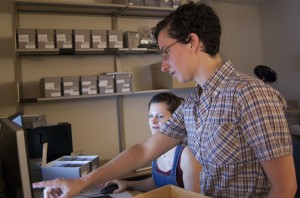Preservation and Access Framework for Digital Art Objects
In February of 2013, Digital Scholarship and Preservation Services (DSPS) began a two-year NEH-funded project to preserve access to the complex born-digital media art objects in CUL’s Rose Goldsen Archive of New Media Art. Read the press release here.
The Goldsen Archive’s collections span a 50-year history of aesthetic experimentation with electronic media, from early video and sound art to interactive digital interfaces and beyond. The Preservation and Access Framework project centers on a target group of interactive digital works for CD-ROM, DVD-ROM, and the Internet, which chart the transformation of artistic practices across two crucial decades of the digital revolution—the shift from analog to disc-based to networked and Web-based applications. These artworks constitute an important art historical collection, and a vital record of our cultural and aesthetic history as a digital society. Our project addresses an increasingly urgent demand for institutional preservation and access strategies for interactive, born-digital assets, with the understanding that these materials will be essential for the study, appreciation, and understanding of digital cultural history
Recent progress with CULAR has made it possible to begin provisioning for large-scale ingest of bit-level copies of these assets into a secure digital repository. This is an essential preservation measure, but will not guarantee fully interactive access to the artworks.
In addition to developing SIPs (Submission Information Packages) for these artworks and procedures for automating their processing and ingest, the project will also create a broader preservation metadata framework and workflow in order to emphasize “best possible” access, as informed by the needs of various user constituencies.
Project staff from DSPS and Rare and Manuscript Collections are joined by Desiree Alexander, dual Masters student in Information Science and Public History at Albany, who is Collections Analysis Assistant for the project, and Dianne Dietrich (Physics and Astronomy Librarian), who joins the project as Digital Forensic Analyst and technical lead.
Under Dianne Dietrich’s direction, the technical team has nearly completed preliminary experimentation with emulation platforms and an initial technical overview of artworks in the test bed. We recently began the next project phase, with the arrival of a dedicated digital forensics workstation. Shared by Digital Scholarship and Preservation Services, Rare and Manuscript Collections, and CUL-IT, this workstation makes a welcome addition to CUL’s audiovisual media preservation lab and expands CUL’s portfolio of media preservation capabilities.
Though just now wrapping up its initial stages, the Preservation and Access Framework project has already helped RMC and DSPS define and implement sustainable preservation policies and workflows for born-digital media. Please see the project wiki or contact Mickey Casad (mir9@cornell.edu) for more information, and stay tuned to DSPS Press for further updates about project milestones and discoveries.

Dianne Dietrich explains the things in the new CUL digital forensics lab, while Desiree Alexander looks on.
Preservation and Access Framework for Digital Art Objects Project Team
Principal Investigators:
Oya Rieger (Associate University Librarian for Digital Scholarship and Preservation Services)
Timothy Murray (Director, the Society for the Humanities, Professor of English and Comparative Literature, Curator of the Rose Goldsen Archive of New Media Art).
Staff:
Mickey Casad (Curator for Digital Scholarship; Project Manager)
Dianne Dietrich (Physics and Astronomy Librarian; DSPS Fellow; Digital Forensic Analyst)
Desiree Alexander (Collections Analysis Assistant)
Jason Kovari (Metadata Librarian for Humanities and Special Collections; Metadata Specialist)
Danielle Mericle (Director, Digital Media Group; New Media Specialist)
Liz Muller (Curator of Digital Collections, RMC; Digital Preservation Specialist)
Michelle Paolillo (Manager, CULAR; Archival Repository Liaison)
Consultants:
AudioVisual Preservation Solutions (Alex Duryee, Chris Lacinak, Cara VanMalssen)
All-Star Advisory Board:
Ben Fino-Radin (Digital Conservator, Rhizome at the New Museum, New York, NY)
Jean Gagnon (Director, Montreal Cinemateque, Canada)
Rebecca Guenther (Independent Metadata Consultant)
Matthew Kirschenbaum (Associate Professor of English, Associate Director, Maryland Institute for Technology in the Humanities, University of Maryland)
Jon Ippolito (Associate Professor of New Media, University of Maine)
Norie Neumark (Director, Centre for Creative Arts & Chair and Professor, Cinema and Media Studies Program, La Trobe University, Melbourne, Australia)
Christiane Paul (Curator of New Media Arts, Whitney Museum of American Art)
Richard Rinehart (Director, Samek Art Gallery, Bucknell University)
Simeon Warner (Director, Software Development & Repository Architecture, Cornell University Library)
